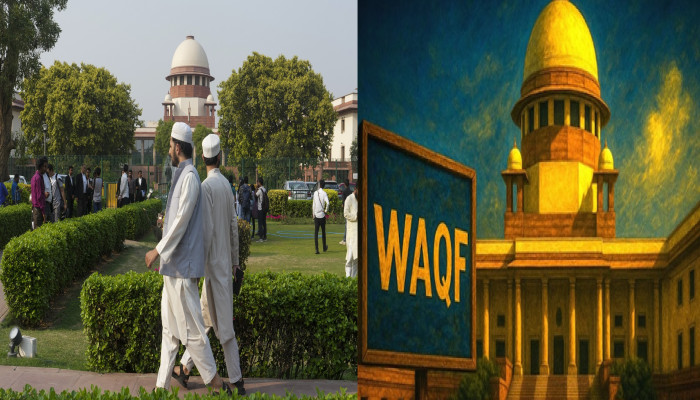Waqf Amendment Act in SC: Centre gets 7 days to submit preliminary response, relevant documents
- In Reports
- 06:12 PM, Apr 17, 2025
- Myind Staff
On Wednesday, the Supreme Court raised serious concerns about the Waqf (Amendment) Act, 2025, especially regarding its proposal to end the practice of 'waqf by user.' This principle historically allowed properties to be considered waqf based on long-term religious use. A three-judge bench, led by Chief Justice Sanjiv Khanna, warned that removing this practice could have significant consequences, though they did not issue any temporary orders. The hearing will continue on Thursday.
The bench, which also included Justices Sanjay Kumar and KV Viswanathan, strongly disagreed with the government's argument in favour of allowing non-Muslims to serve on waqf boards. The government had tried to defend this by making a comparison: if only Muslims were allowed to serve on waqf boards, then only Muslim judges should hear waqf-related cases. The court found this comparison troubling. The bench, while asking the Centre to clarify the removal of the 'waqf by user' rule, said that most mosques built between the 14th and 16th centuries wouldn’t have proper sale documents.
"You still haven't answered the question. 'Waqf by user' will be declared or not? That will be undoing something that's been established. How will you register in the case of 'waqf by user'? You can’t say there will be no genuine user," the bench said. The Supreme Court said that asking such mosques to provide registered ownership documents would not be practical, as these structures are typically waqf (endowed) properties used by the public.
Meanwhile, West Bengal Chief Minister Mamata Banerjee indirectly criticised Prime Minister Narendra Modi and the Bharatiya Janata Party (BJP), accusing them of being hypocritical in how they treat Muslims. She said that while the BJP shows an anti-Muslim attitude within India, its leaders are happy to accept hospitality from Muslim-majority countries when they travel abroad. "You speak against Muslims here, but when you visit Saudi Arabia or the UAE, you gladly accept their hospitality," Banerjee said, as quoted by ANI. "You say one thing at home and another when you're overseas," she added, noting what she described as a glaring contradiction in the party's domestic and international posturing.
However, responding to the Supreme Court's question on whether Muslims can be part of Hindu religious trusts—a query raised during the hearing on petitions against the Centre's Waqf (Amendment) Act, 2025—BJP MP Jagdambika Pal told ANI that the question is valid and not something new or unheard of. "The Supreme Court is raising this question now, but similar observations have already been made in earlier judgments," Pal said. He also explained that the Supreme Court, in earlier decisions, has clearly said that the Waqf Board is not a religious organisation. Instead, it is a legal and official body responsible for managing Waqf properties. "Since it is an administrative institution and not a religious one, there is no issue in having both Muslim and non-Muslim members on the board," he added.
Meanwhile, Solicitor General Tushar Mehta, speaking on behalf of the Centre, told the Supreme Court that the government is answerable to the people. He said that a large number of people have approached the government with concerns about vast areas of land, even entire villages in some cases, being declared as Waqf properties. "This legislation was brought in response to lakhs of such representations. Villages after villages, countless plots are being declared as Waqf," Mehta submitted, noting that the matter has significant public implications. Mehta asked the court not to make any quick or temporary decision, saying that putting a hold on the amended Act right now would be "extremely harsh." He requested one week to submit an initial response along with important documents, explaining that the matter needs thorough discussion and should not be decided in a hurry.
Subsequently, the Supreme Court noted that the legislation contains certain positive provisions and therefore a complete stay on the law is not justified. The court also made it clear that the current situation should not be disturbed while the matter remains under judicial consideration. However, the Apex Court decided not to grant an interim stay to the Waqf (Amendment) Act, 2025. The court ordered that there should be no changes to the nature of any Waqf property, including those registered or declared under the practice of 'waqf by user'. The court instructed that all Waqf properties, regardless of their classification, must be kept as they are until the next hearing. Additionally, it directed that no new appointments should be made to any Waqf Board during this time. The Centre has been given seven days to submit its initial response along with the necessary documents.
Meanwhile, AIMIM MP Asaduddin Owaisi stated that he believes the Waqf Act is "unconstitutional" during the hearing in the Supreme Court. “The Court has said that the Central Waqf Council and the State Waqf Council will not be constituted, and 'Waqf by user' cannot be deleted. During the deliberations of the JPC, I gave a report opposing all amendments proposed by the government, and during the debate on the bill, I called the bill unconstitutional. Our legal battle against this Act will continue,” Owaisi said.







Comments